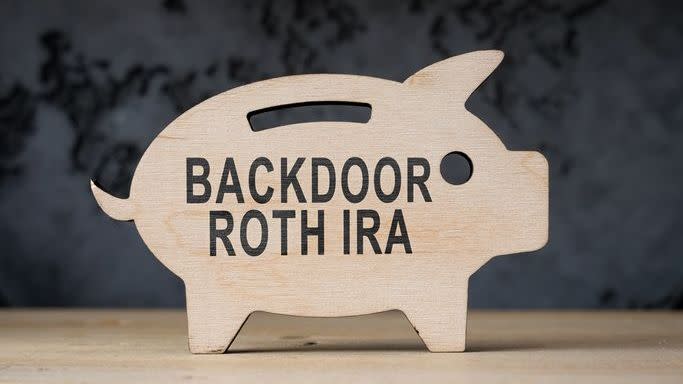I’d like to ask about the backdoor Roth IRA. Say you are over the income limit for Roth contributions, so you make a traditional contribution with no tax deduction and then do a backdoor Roth. Is that conversion taxable? If so, you would be paying tax on that money twice since you paid tax on that income already. I’m confused.
– Jeff
The rules for backdoor Roth IRAs can seem confusing, and some scenarios are more complicated than others. Ideally, a nondeductible (after-tax) traditional IRA that gets converted into a Roth IRA would not be subject to any taxes, so the funds would not be taxed twice. To be clear, no converted funds would get double-taxed, but some circumstances can result in a taxable transaction. That’s where the rules get more complicated. (And that’s why it’s a good idea to consult with a financial advisor when deciding whether a backdoor Roth makes sense for you.)
Let’s take a quick step back and look at the backdoor Roth. Since many people are ineligible to make Roth IRA contributions due to their income levels, the backdoor Roth strategy helps sidestep those rules. And because Roth IRAs offer the opportunity for tax-free growth and withdrawals without the burden of required minimum distributions (RMDs), this can be a highly lucrative move to make.
For tax year 2023, you can’t contribute to a Roth IRA if your modified adjusted gross income (MAGI) is more than $153,000 for single filers or $228,000 for married couples filing jointly. Those limits increase to $161,000 and $240,000, respectively, for 2024.
While you’d be locked out of contributing to a Roth IRA if your income exceeds these limits, you can still contribute to a traditional IRA regardless of your income level. That’s the starting point for your backdoor Roth.
The mechanics of creating a backdoor Roth are straightforward (ignoring the tax issues for a moment). You contribute to a traditional IRA and then convert it to a Roth IRA. It’s that easy. (But if you need additional guidance concerning backdoor Roth conversions or other financial maneuvers, consider speaking with a financial advisor.)
When Does a Backdoor Roth Not Make Sense?
For many people, the long-term tax benefits of Roth conversions far outweigh the downsides. Those benefits include:
Tax-free growth
Tax-free withdrawals in retirement
No RMD requirements, so you can let your money grow for as long as you want
But in some cases, the drawbacks outweigh the benefits. A backdoor Roth conversion may not make good financial sense if:
You have a lot of pre-tax money in traditional IRAs and could be subject to the pro-rata rule (more on that below)
You need to pull money from your retirement account to pay taxes on the conversion, which creates a taxable event and possibly IRS early withdrawal penalties
You’ll need to use that money within five years, which could result in taxes and penalties
The conversion will land you in a higher tax bracket and a bigger-than-planned tax bill
(A financial advisor can help you determine if a Roth conversion makes sense for you and how much to convert for the most beneficial tax treatment.)
The Pro-Rata Rule
If your traditional IRA contains a mix of deductible and nondeductible contributions, Roth conversions get more complicated and involve some IRS math. They don’t allow you to choose which portion of the IRA you’re converting, meaning you can’t just roll over the nondeductible – and therefore nontaxable – part.
The pro-rata rule calculates how to divide your Roth conversion into its taxable and nontaxable segments. It starts by combining all of your traditional (non-Roth) IRAs to come up with a total basis. Next, you figure out the percentage of nontaxable funds in that total. Finally, you apply that percentage to your Roth conversion to figure out its nontaxable portion.
Here’s an example with numbers. Say Gina has traditional IRAs with a total balance of $100,000. She’s made $25,000 of nondeductible contributions, so her nontaxable percentage would be 25% ($25,000/$100,000). Now she wants to convert $25,000 to a Roth IRA. Using the pro-rata rule, the nontaxable portion of that conversion would be $6,250 (25% x $25,000), and the rest would be added to her taxable income for the year. (Consider matching with a financial advisor if you have questions about the pro-rata rule.)
Dealing With the Taxes
Most traditional IRAs are funded with pre-tax dollars, so converting those to Roth accounts typically increases a person’s tax liability. Even with that tax hit, it can still be beneficial to do a Roth conversion and enjoy tax-free growth and tax-free withdrawals in retirement.
If you have a mix of deductible and nondeductible contributions in your IRA, the pro-rata rule comes into play and you’ll pay taxes on at least a portion of the conversion.
Ideally, to implement the backdoor Roth strategy you’d contribute to an empty traditional IRA – the only one you have – to avoid extra tax complications for the conversion. You won’t deduct the traditional IRA contributions on your taxes, so you’ll be funding it with after-tax dollars – the same as you would have if you made a direct Roth contribution. (Your traditional IRA contribution will be treated as nondeductible with a completed IRS Form 8606.)
The conversion can then be completed tax-free. However, any investment earnings that occur between the dates of the contribution and the conversion will be subject to taxes, so it makes sense to complete the conversion as quickly as possible. (This is why it may make sense to first speak with a financial advisor who specializes in taxes.)
Bottom Line
You won’t pay double taxes with a backdoor Roth, but you may end up paying some taxes depending on your financial situation. Talk with your financial advisor before making this move to minimize taxes and maximize retirement benefits.
Tips for Tax Season
If you’re converting a pre-tax IRA into a Roth account, be mindful of your tax bracket. Converting too large of a balance could push you into the next tax bracket and increase your marginal tax rate. Instead, you may consider converting just enough pre-tax money to “fill up” your current tax bracket but not exceed it.
A financial advisor with tax expertise can help you optimize your tax strategy. Finding a financial advisor doesn’t have to be hard. SmartAsset’s free tool matches you with up to three vetted financial advisors who serve your area, and you can have a free introductory call with your advisor matches to decide which one you feel is right for you. If you’re ready to find an advisor who can help you achieve your financial goals, get started now.
Keep an emergency fund on hand in case you run into unexpected expenses. An emergency fund should be liquid -- in an account that isn't at risk of significant fluctuation like the stock market. The tradeoff is that the value of liquid cash can be eroded by inflation. But a high-interest account allows you to earn compound interest. Compare savings accounts from these banks.
Michele Cagan, CPA, is a SmartAsset financial planning columnist and answers reader questions on personal finance and tax topics. Got a question you’d like answered? Email AskAnAdvisor@smartasset.com and your question may be answered in a future column. Reader-submitted questions may be edited for clarity or brevity.
Please note that Michele is not a participant in the SmartAsset AMP platform, nor is she an employee of SmartAsset. She has been compensated for this article.
Photo credit: ©iStock.com/designer491, ©iStock.com/ChayTee
The post Ask an Advisor: Is a Backdoor Roth Conversion Taxable Even If I Didn’t Take a Deduction on My IRA Contributions? appeared first on SmartReads by SmartAsset.


